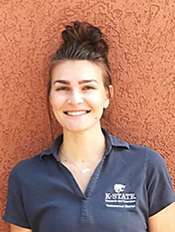
Many gardeners make compost without understanding how to use it around the home. Composthas a number of horticultural applications, which are described below.
Fertilization and soil improvement. Organic materials can be added to improve soil looseness and workability. Heavy, tight clay soils benefit from the loosening effects of composted organic materials. In sandy soils, organic material acts as a sponge to hold water and nutrients.Compost contains nutrients plants require. The amount of specific nutrients depends on the types of materials composted and how much water the pile contains. The suggested application rate is 50 to 100 pounds per 100 square feet, which is about ¼ inch of material spread over the entire garden. The best time to apply compost is just before tillage in either the spring or fall to incorporate the compost throughout the root zone. In Kansas, garden soils are often tilled in the fall. Compost made early in the season should be ready by then, or use last year’s compost if you have a two-pile system.
Compost at planting. Apply a band of compost in the bottom of a row trench or add several shovels full to the bottom of planting holes. Tomato plants, perennial flowers, trees, and shrubs benefit from the slow release of nutrients through the early growth period. Compost can be applied as a top dressing for seeded vegetables and flowers to prevent soil crusting. It can be used as a substitute for soluble fertilizer or starter solution when mixed in equal parts with water.Leftover compost can be added to garden soil later.
Potting mix for seedlings. Compost that has been screened for large particles can be mixed with soil or sand in approximately equal parts, and then used as a growing medium. To ensure healthy seedlings, compost should be well deteriorated and free of harmful disease organisms and insects.
Using compost on a lawn. The best way to use compost is to apply it liberally before planting. Fertilize by adding a thin layer of top dressing every year.
Lauren Fick is the Horticulture Extension Agent for the Cottonwood Extension District. If you have questions, she can be contacted by e-mail at [email protected] or by phone at 785-628-9430 or 620-793-1910.






